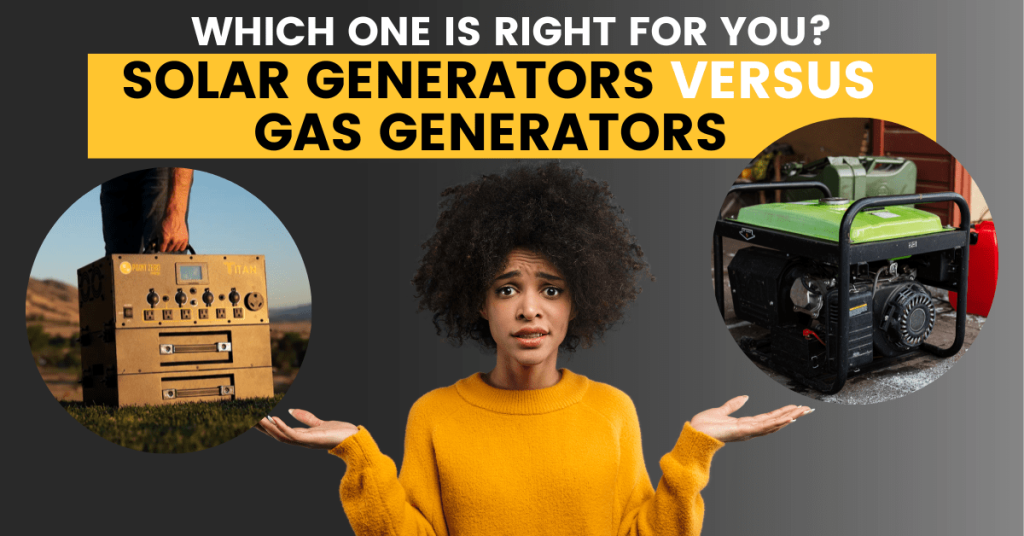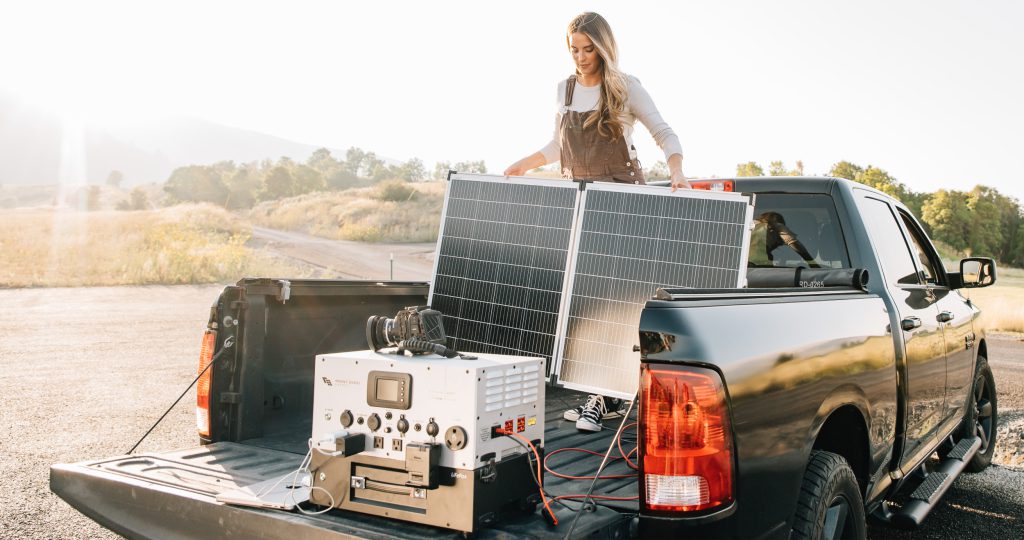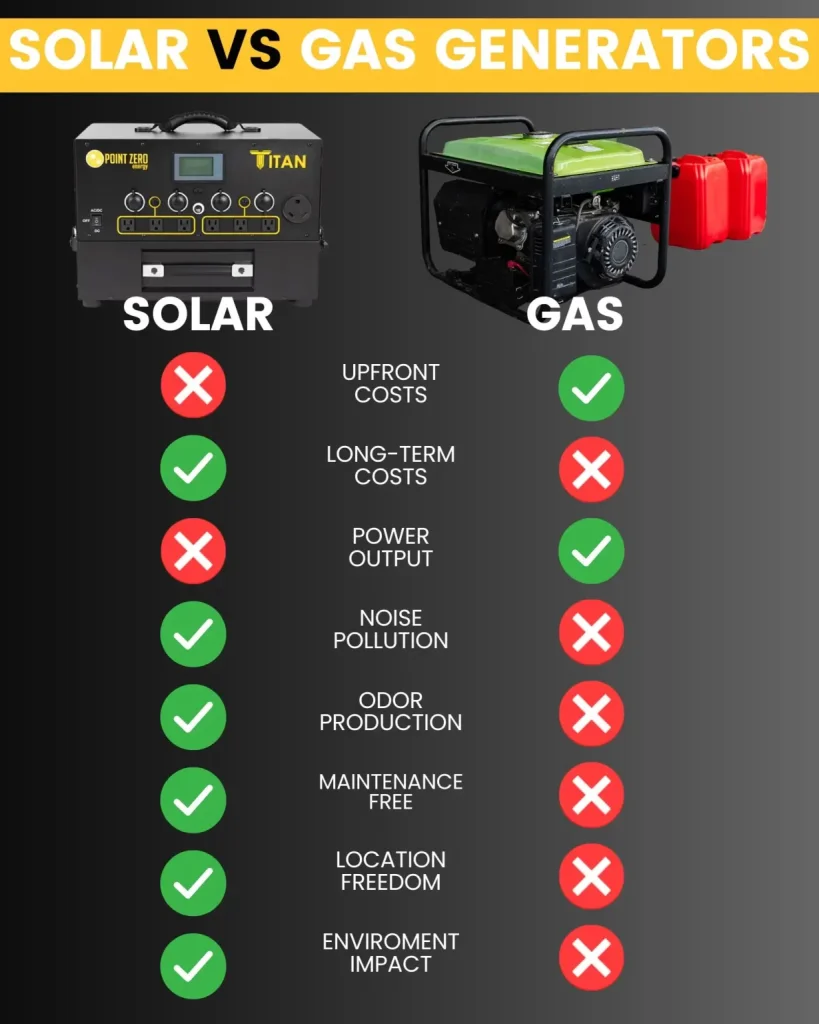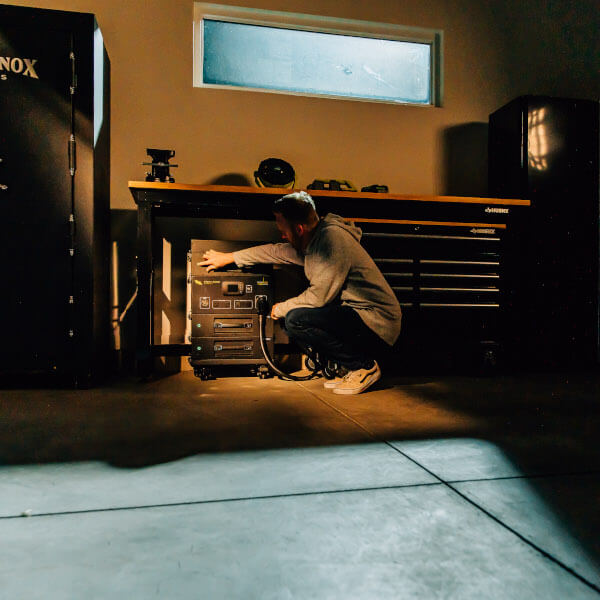When it comes to power generation, there are two main options available: gas generators and portable solar power generators. While gas generators have been the traditional choice for many, the rise of portable solar power generators in recent years has left many wondering which option is better. In this article, we’ll compare the differences between portable solar power and gas generators, and help you decide which one is right for you.

Gas generators are versatile machines that can be used in a wide range of applications. They’re often used as backup power sources during power outages or as a source of electricity in remote areas where grid power is not available. Gas generators are also commonly used on construction sites to power tools and equipment, as well as for outdoor events and camping trips.
There are three main types of fuel that gas generators can run on: gasoline, propane, and diesel. Gasoline-powered generators are the most common type and are widely available at hardware stores and home improvement centers. Propane generators are often used as backup power sources for homes and businesses, as propane is a readily available fuel source that can be stored safely for extended periods. Diesel generators are typically used in industrial or commercial settings, where they can provide large amounts of power over extended periods.
Gas generators come in a variety of sizes, from small, portable units that can be carried by hand to large, stationary models that are permanently installed. Portable gas generators are typically used for outdoor activities such as camping, tailgating, or outdoor events, while stationary gas generators are often used in commercial or industrial settings where they provide backup power for critical infrastructure.
Portable solar power generators are an increasingly popular alternative to traditional gas generators due to their environmentally friendly nature and ease of use. They work by harnessing the power of the sun through a solar panel, which converts sunlight into electrical energy. This energy is stored in a battery pack for later use and is converted into usable electricity through an inverter.
The components of a portable solar power generator are relatively simple. The solar panel is usually made up of a series of photovoltaic cells that convert sunlight into direct current (DC) electricity. This electricity is then stored in a battery pack, which can be made up of one or more rechargeable batteries. The inverter then converts the DC electricity into alternating current (AC) electricity, which is the type of electricity that most home appliances and electronics use.
Portable solar power generators come in a variety of sizes and capacities, with smaller models typically able to power small electronics such as phones and laptops, while larger models can power larger appliances such as refrigerators or even entire homes. They are also lightweight and easy to transport, with many models featuring handles or wheels for easy mobility.

When it comes to upfront cost, gas-powered generators are typically the most budget-friendly option, with prices ranging from a few hundred dollars to a few thousand dollars. In contrast, portable solar power generators have a higher upfront cost, often costing several thousand dollars. However, the actual upfront cost will depend on the size and capacity of the generator you choose. While a portable solar power generator may require a larger initial investment, it is important to consider the long-term cost savings as they do not require any ongoing fuel costs.
Gas generators and portable solar power generators differ significantly in terms of their power output. Gas generators are well-known for their ability to generate large amounts of electricity quickly, with a high power output. In contrast, portable solar power generators have a lower power output and take a longer time to recharge.
This difference is understandable because gas generators rely on the burning of fossil fuels to generate power, which provides access to a significant amount of energy while the fuel source is available. However, once the fuel runs out, the power output drops to zero.
Nonetheless, the power capabilities of either type of generator should be sufficient as long as you select the appropriate size for your needs.
Another significant difference between gas generators and portable solar power generators is the amount of noise they produce. Gas generators are known for their loud, obnoxious noise levels, which can be a problem for many people, especially if they’re using the generator in a residential area. Portable solar power generators, on the other hand, are nearly silent and won’t disturb your neighbors. Using a solar generator anywhere is convenient since it operates noiselessly, so you don’t have to worry about creating unnecessary noise disturbances.
Another key difference between gas and solar generators is the amount of odor they produce. Gas generators emit strong, unpleasant odors due to the burning of fossil fuels, and this can be a concern for people who are sensitive to odors or who live in close proximity to the generator. This odor can also make gas generators less ideal for use in enclosed spaces, such as garages or basements.
In contrast, solar generators produce no odor whatsoever, making them a more pleasant and eco-friendly choice. The lack of odor emissions means that they can be safely used indoors or in other enclosed spaces without the need for ventilation or air filtration systems. This can be especially beneficial in emergency situations where power outages may require the use of a generator for an extended period of time.
Additionally, the lack of odor emissions from solar generators makes them ideal for use in outdoor settings where the enjoyment of nature and fresh air are a priority. This is especially true for camping or other outdoor activities where the use of a gas generator would be disruptive to the natural environment.
Overall, the lack of odor emissions from solar generators makes them a more pleasant and environmentally-friendly choice for anyone who wants to reduce their carbon footprint and enjoy a cleaner, odor-free power source.
Maintenance requirements are another important factor to consider when comparing gas and solar generators. Gas generators require regular maintenance, such as oil changes, air filter replacements, and spark plug replacements. These tasks can be time-consuming and may require the help of a professional, adding to the overall cost of ownership.
In contrast, solar generators require minimal maintenance. There are no moving parts in a solar generator, and they don’t require fuel to operate. This means that there are no oil changes, air filter replacements, or spark plug replacements to worry about. In fact, the biggest maintenance required for a solar generator is to keep the solar panels clean and free of debris.
The lack of maintenance required for solar generators makes them a more convenient and hassle-free option. You can set it up and forget about it, without worrying about regular maintenance or unexpected breakdowns.
In addition, the simplicity of solar generators also means that there are fewer potential points of failure, reducing the risk of mechanical issues and breakdowns. This can make solar generators a more reliable option for emergency backup power or long-term use.
Overall, the minimal maintenance requirements of solar generators make them a more convenient and hassle-free option compared to gas generators, which require regular maintenance and upkeep. This can save time and money in the long run, making solar generators a more attractive option for many homeowners and outdoor enthusiasts.
When comparing gas generators and solar generators, one of the key differences is the location freedom they provide. While gas generators are typically restricted to outdoor use due to their noise and fumes, solar generators can be used anywhere, indoors or outdoors, without causing disturbance or environmental damage.
For example, if you’re camping in a remote area, a solar generator can power your equipment without disturbing the peace and tranquility of nature, while a gas generator would produce noise and fumes that could affect the environment and other campers. Similarly, if you’re working on a construction site in a residential area, a solar generator can power your equipment without disturbing nearby residents, while a gas generator would produce loud noise and unpleasant odors.
In urban areas where noise and air pollution are a concern, solar generators are the clear choice. They can be used to power your home or office without causing disturbance to your neighbors or contributing to local air pollution. Gas generators, on the other hand, are often restricted to outdoor use due to their noise and fumes.
In summary, when it comes to location freedom, solar generators have a clear advantage over gas generators. They operate quietly and cleanly, and can be used anywhere without causing disturbance or environmental damage.
Gas generators have long been the go-to power solution for people who require a reliable source of electricity. However, with the increasing awareness of the negative impact of fossil fuels on the environment, many people are now looking for alternative power sources that are both environmentally friendly and sustainable. This is where solar generators come in.
Gas generators produce harmful emissions, such as carbon monoxide and nitrogen oxides, which contribute to air pollution and climate change. These emissions can also be harmful to human health, particularly in confined spaces where the generator is being used. In addition, gas generators require a constant supply of fuel, which is typically a non-renewable resource. This means that as demand for fuel increases, prices will rise and the availability of fuel will become more limited.
In contrast, portable solar power generators produce clean, renewable energy with no negative impact on the environment. Solar generators use the power of the sun to generate electricity, which means that they have an unlimited source of energy as long as the sun continues to shine. Solar generators do not produce any emissions, making them safe for use in any environment, including indoors. They are also silent and require little maintenance, making them an ideal choice for those who value convenience and ease of use.
In summary, the environmental impact of gas generators is a growing concern, as they produce harmful emissions and require a constant supply of fuel that is not sustainable in the long term. Solar generators, on the other hand, offer a clean and sustainable source of energy that is renewable and has no negative impact on the environment. With their unlimited energy source, silent operation, and low maintenance requirements, solar generators are an excellent alternative to gas generators for those looking to power their home or appliances.
One major advantage of purchasing a portable solar power generator is the availability of a federal tax credit. When you buy a solar generator, you can qualify for a tax credit of up to 30% of the purchase price. This credit can help offset the higher upfront cost of a solar generator and make it a more cost-effective choice in the long run.
Gas generators, on the other hand, do not offer any tax incentives for their purchase. While they may have a lower upfront cost, the ongoing fuel expenses and maintenance costs can add up over time. In addition, gas generators contribute to air pollution and emit harmful emissions, which can have a negative impact on the environment. Overall, the tax rebate perks for purchasing a solar generator make it a more attractive and eco-friendly option.
So, which is better: a gas generator or a portable solar power generator? It depends on your specific needs. Gas generators are ideal for high power output and quick recharge times, but they’re noisy, require fuel, and have a negative impact on the environment. Portable solar power generators, on the other hand, are nearly silent, produce clean energy, and require no ongoing fuel costs, making them ideal for outdoor activities, emergency backup power, or for those who are environmentally conscious. When deciding between a gas generator and a portable solar power generator, consider your power needs, budget, and environmental impact, and choose the option that best suits your needs.

The Point Zero Titan Boost solar generator boasts a powerful lithium-Iron-Phosphate battery with a capacity of 2,500 watt hours. This makes it one of the largest batteries available in portable solar generators, providing ample energy storage for all your power needs on the go.
One of the key advantages of the Titan’s battery is its ability to store energy for extended periods, making it a great option for anyone who needs portable power in remote locations or without access to traditional power sources. With this kind of energy storage, you can charge the generator during the day and then use the stored energy at night, whether you’re camping or RVing.
Durability and longevity are also major benefits of the Titan’s lithium battery. It’s designed to withstand the rigors of outdoor use and has a lifespan of up to 15 years, so you won’t have to worry about replacing it anytime soon. This battery’s durability and long life means you can have reliable power and peace of mind for many outdoor adventures to come.
The Titan with only one battery has an output voltage of 120V AC and a continuous power output of 3,000 Watts. With a continuous power output of 3,000 watts, the Titan portable solar generator is capable of powering a wide range of electronic devices. Some examples of what the Titan can power include:
Smart Phone (12W) for 71 hours.
Laptop (50W) for 28.5 hours.
Cook Top Stove (1500W) for 1.2 hours.
Lightbulb (10W) for 77 hours.
42″ TV (100W) for 16 hours.
CPAP Machine (65W) for 86.5 hours.
Microwave (100W) for 1.8 hours.
Refrigerator (71W) for 21.5 hours.
After weighing all the pros and cons of solar and gas generators, it’s clear that solar generators have a significant advantage. As we continue to shift towards a more eco-friendly society, alternative energy sources such as solar power will likely become more popular. The solar industry has made significant advancements in a short period, making it a reliable and cost-effective power source.
If you have any further questions about power generators, don’t hesitate to give reach out to the Point Zero Energy team.


Richard Dixon says:
Do take PayPal?
Point Zero Energy says:
We currently take credit card, echeck or paper check. We give discounts for echeck and paper check, but I am sorry, we don’t currently accept paypal.
Urgent Hurricane Preparedness Guide - Point Zero Energy says:
[…] During hurricanes, power outages are often widespread and can last for days, leaving entire communities without electricity. For example, Hurricane Helene left millions without power, affecting nearly 3 million people across the southeastern U.S., with some regions experiencing extended outages due to downed power lines and infrastructure damage. To prepare for such disruptions, it’s critical to arrange for emergency backup power, such as gas generators or solar generators. […]